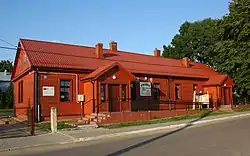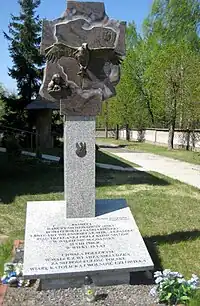Narewka
Narewka [naˈrɛfka] (Belarusian: На́раўка, romanized: Narawka) is a village in eastern Poland, with its population estimated at 935 residents (as of 2011).[1] It is located in Gmina Narewka, Hajnówka County, within Podlaskie Voivodeship.[2] The village is located near Poland's border with Belarus, and is situated on the river Narewka. Many of its residents belong to Poland's Belarusian minority.
Narewka | |
|---|---|
 Galeria Tamary Sołoniewicz | |
 Coat of arms | |
 Narewka | |
| Coordinates: 52°50′10″N 23°45′27″E | |
| Country | |
| Voivodeship | Podlaskie |
| County | Hajnówka |
| Gmina | Narewka |
| Population (2011) | |
| • Total | 935 |
| Time zone | UTC+1 (CET) |
| • Summer (DST) | UTC+2 (CEST) |
| Postal code | 17-220 |
| Area code | +48 85 |
| Car plates | BHA |
It is in one of five Polish-Belarusian bilingual regions in Podlaskie Voivodeship regulated by the Act of 6 January 2005 on National and Ethnic Minorities and on the Regional Languages, which permits certain gminas with significant linguistic minorities to introduce a second, auxiliary language to be used in official contexts alongside Polish.[3]
The village has Polish Catholic and Belarusian Eastern Orthodox churches. It used to have a synagogue, but it was burned down by the local Jewish population in 1940, angered after the Red Army, which had invaded Poland in 1939, desecrated the synagogue by turning it into a storage building. The vast majority of Narewka's once predominant Jewish community were murdered by the Nazis in the Holocaust in 1940.[4] In 2018, almost 80 years after the burning of the synagogue, a plaque was placed at the site in memory of Narewka's Jewish community. This came about as a collaboration between a local Polish high school and one in Israel.[4]
Narewka, due to its position near the Belarus–Poland border, has been a site of movement of migrants during the Belarus–European Union border crisis that began in 2021. A site in the woods near the village has served as a meeting point with drivers who hope to be able to drive migrants to other European Union countries.[5] There is no actual border crossing in the area, but it continued to be a node for refugees during the Ukrainian refugee crisis that began in 2022 as a result of the Russian invasion of Ukraine.[6]
Notable people
- Leon Leyson (1929–2013), Polish-American Holocaust survivor
References
- "Wieś Narewka (podlaskie) » mapy, GUS, nieruchomości, noclegi, atrakcje, kod pocztowy, regon, wypadki drogowe, kierunkowy, edukacja, demografia, zabytki, statystyki, tabele, linie kolejowe". Polska w liczbach. Retrieved 17 November 2021.
- "Central Statistical Office (GUS) – TERYT (National Register of Territorial Land Apportionment Journal)" (in Polish). 2008-06-01.
- Dz. U. z 2005 r. Nr 17, poz. 141
- "Israeli and Polish schools join to memorialize burned synagogue". Retrieved 2023-10-09.
- Kasia Strek; Marco Store (3 January 2022). "This photographer captured how activists helped migrants at the Poland-Belarus border". Retrieved 9 October 2023.
- Moriah Ballard; Zachery Lashway (2022-03-26). "KPRC 2 IN POLAND: Volunteers in Narewka help support Ukrainian refugees". Retrieved 2023-10-09.

